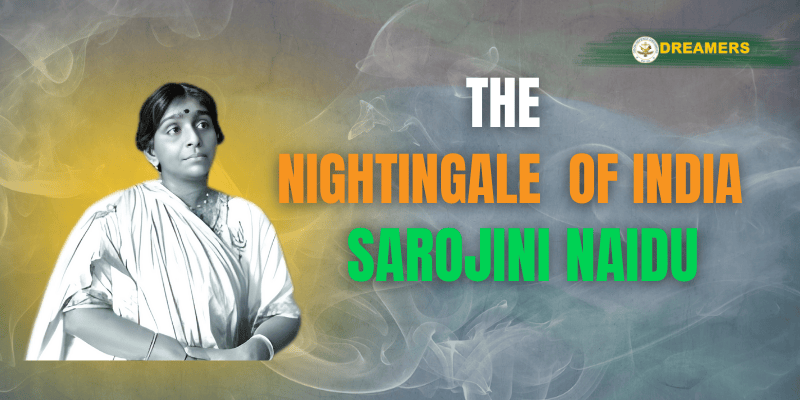Introduction – Who Was Sarojini Naidu?
When we hear the name Sarojini Naidu, most of us first remember the line “Nightingale of India”. But behind this beautiful title was a woman who laughed loudly, argued fearlessly and loved her country like a mother loves her child.
Sarojini Naidu was a rare combination –
she could write soft, musical poetry and at the same time give fiery speeches against British rule. She was a poet, a freedom fighter, a political leader, a mother and a strong Indian woman in one personality.
That is why Sarojini Naidu Jayanti is not just about remembering a famous poet. It is about remembering a woman who proved that a gentle voice can also shake an empire.
Birth Anniversary on 13 February – Why Sarojini Naidu Jayanti Matters Today
Every year, on 13 February, we celebrate Sarojini Naidu Jayanti, her birthday. On paper, it may look like just another “jayanti”, but if we look closely at today’s society, this date becomes very meaningful.
We live in a time where:
Girls still fight for safety and respect,
Many talented daughters are forced to quit studies early,
Women still have to “prove” their capability again and again.
In this background, Sarojini Naidu Jayanti quietly asks us some strong questions:
Are we giving our girls the freedom that Sarojini dreamed of?
Do we allow our daughters to speak, lead and decide?
Are we teaching our sons to respect women as equals?
So, 13 February is not only her birth anniversary; it is also a mirror for us. It reminds us that real celebration is not in speeches and flowers, but in behaviour and mindset.
Early Life, Education and Family Background of Sarojini Naidu
Sarojini Naidu was born in a home where books, ideas and discussions were a daily routine. Her father was a scientist and educationist; her mother wrote poetry. It was quite natural that Sarojini started playing with words at a young age.
As a child, she was not the “silent, perfect” girl many families expect. She was curious, expressive and bold. She read widely, wrote poems and often surprised elders with her intelligence.
Later, she went abroad for higher studies. Imagine an Indian girl in those times, travelling to England to study – it was a big thing. There she saw:
How women were fighting for their own rights,
How countries talked about democracy and equality,
How education can open doors that society tries to keep shut.
When she came back to India, she did not come back as just “someone’s daughter” or “someone’s wife”. She returned as a thinking, aware, independent woman who wanted to contribute to her country.
Sarojini Naidu in India’s Freedom Struggle
It was easy for her to live a comfortable, elite life. She had education, recognition and respect. But she chose a harder road –
she stepped into the freedom struggle.
Sarojini Naidu travelled across India, meeting people, addressing gatherings and connecting the message of freedom to ordinary hearts. She did not only speak in big halls; she also spoke in small town meetings where common people sat on the ground and listened.
She:
Joined major movements against British rule,
Accepted arrest and jail without fear,
Stood next to leaders like Mahatma Gandhi, not as a follower standing behind, but as a leader standing beside.
Whenever the freedom movement needed a strong voice with emotional power, Sarojini Naidu was there. She used her words as weapons, not to hurt people but to wake them up.
First Woman Governor and a Powerful Political Voice
After independence, many people expected that Sarojini Naidu would get some important role, and she did. But the real achievement was not just the position she held – it was the barrier she broke.
She became:
The first Indian woman to lead the Indian National Congress,
The first woman Governor of an Indian state.
At a time when many women were not even allowed to step out alone, she was running a state, taking official decisions and representing the Government.
Think about the message it sent to lakhs of girls across the country:
“If she can sit in the Governor’s chair, why can’t I sit in the officer’s chair, the doctor’s chair, the judge’s chair?”
Her journey clearly showed that leadership does not belong to any gender. It belongs to those who are ready to take responsibility.
The Nightingale of India – Poetry, Literature and Impact on Society
Before people heard her in political meetings, they had already heard her through her poems.
Her poetry was full of:
Colours of Indian markets and festivals,
Sounds of temple bells and street vendors,
Emotions of love, pain, hope and patriotism.
She wrote in English but carried the fragrance of Indian soil in every line. That is why she was lovingly called the “Nightingale of India” – a bird whose song touched every heart that listened.
Her poems were not dry lectures on nationalism. They were soft but powerful reminders that India deserved freedom and that her people deserved dignity.
Art, for her, was not a hobby; it was a bridge:
Between rich and poor,
Between educated elites and common people,
Between the dream of freedom and the reality of slavery.
Even today, when we read her poems, we feel the same gentle strength that made her such a respected figure.
National Women’s Day in India – Why 13 February Is Dedicated to Women
India has chosen 13 February, Sarojini Naidu’s birthday, as a day to celebrate women of the nation. This is called National Women’s Day in India.
This is a beautiful message:
On the birthday of a woman who broke so many barriers, we honour every woman who is trying to break her own barrier today.
On this day, we can:
Talk openly about problems like gender discrimination, early marriage, domestic violence and lack of opportunity,
Celebrate stories of women who are doing inspiring work in defence, sports, science, police, education, business and social service,
Remind ourselves that respect for women is not a one-day event, it is a daily discipline.
When schools, colleges and coaching institutes celebrate National Women’s Day on 13 February, they are not just praising Sarojini Naidu. They are also saying to every girl in the room:
“You are important. Your dreams matter. We are with you.”
Values and Life Lessons from Sarojini Naidu for Today’s Youth & Defence Aspirants
For today’s youth, especially those who want to join the armed forces, Sarojini Naidu’s life is like a ready-made character-building guide.
1. Moral Courage
She spoke what she believed, even when it was unpopular or risky. For a defence aspirant, this is crucial. The uniform needs people who can stand up for what is right, not just follow the crowd.
2. Clear Communication
Her speeches and poems were powerful because her words were clear and honest. In SSB interviews, group discussions and lecturette, this quality is priceless – being able to express thoughts simply, confidently and respectfully.
3. Respect for Every Human Being
She worked with people from different religions, regions and social backgrounds. Future officers also have to work with jawans and colleagues from every part of India. Learning to respect diversity is a direct lesson from her life.
4. Strength with Sensitivity
She was strong, but not harsh. She could lead a protest and still speak with warmth. Defence aspirants must also balance toughness with empathy – a real leader listens and understands.
5. Service to the Nation
Her entire journey, from poetry to politics, was connected by one thread – service. That is exactly what the Indian Armed Forces expect:
“Nation first, always and every time.”
Doon Defence Dreamers’ Perspective on Sarojini Naidu Jayanti and Women Empowerment
If we look at Sarojini Naidu Jayanti from the perspective of Doon Defence Dreamers (Best CDS coaching institute in Dehradun), this day is much more than a historical remembrance – it becomes a powerful reminder of what every young girl in India can achieve.
Sarojini Naidu was a woman who refused to stay inside the limits society tried to set for her. She became a poet when people expected silence, a national leader when women were hardly visible in politics, and a Governor when most women were not even allowed to dream that big. Her journey is exactly the kind of story that Doon Defence Dreamers wants every girl to see and feel.
In every batch, the academy meets girls who want to join NDA, CDS, AFCAT, Navy, or paramilitary forces, but somewhere in their mind they still carry doubt:
“Will I be able to do it?”
“Will my family support me?”
“Can I really live a disciplined defence life?”
On Sarojini Naidu Jayanti, Doon Defence Dreamers can connect her life with these questions. Just as Sarojini Naidu used her voice to fight for freedom and dignity, today’s daughters can use their courage, hard work and discipline to wear the uniform and serve the nation.
For the academy, women empowerment is not just a slogan. It means:
Training girl aspirants with the same seriousness and standards as boys,
Giving them a safe, respectful and encouraging environment,
Helping parents understand that a daughter in uniform is a matter of pride, not fear,
Teaching all cadets – boys and girls – to work together as equal members of one team.
A message from Doon Defence Dreamers on this day can be simple but powerful:
“On Sarojini Naidu Jayanti, we salute every daughter who chooses courage over comfort. At Doon Defence Dreamers, our mission is to turn that courage into selection and that dream into a commission.”
In this way, Sarojini Naidu Jayanti becomes a living bridge between her fight for freedom and today’s girls preparing to defend that freedom.
How Schools, Colleges and Coaching Institutes Can Celebrate Sarojini Naidu Jayanti
Many institutions want to celebrate such days but do not know what to do beyond a simple speech. Here are some practical, easy-to-do ideas:
Story Session:
Instead of a long, boring biography, narrate 3–4 short, interesting incidents from Sarojini Naidu’s life and ask students what they learnt from each.Role Play or Skit:
Students can act out a scene where she addresses a crowd or talks to young girls about education. This leaves a long-lasting impression.Poetry Corner:
Display a few of her famous lines on the notice board and invite students to write their own short poems on freedom or women’s strength.Open Mic for Girls:
Give the stage to girls for one morning assembly – let them speak, recite, sing or share their experiences.SSB Style Activities (for defence academies):
Use topics like “Role of women in defence” or “What Sarojini Naidu teaches today’s youth” for group discussions, lecturette and interview practice.
These small actions can make Sarojini Naidu Jayanti a day that students remember not only for attendance, but for inspiration.
Short Essay, Speech and GK Points for Students
To help students quickly, here are some ready reference points:
Sarojini Naidu was a poet, freedom fighter and political leader.
She is called the “Nightingale of India” because of her beautiful, musical poetry.
Her birthday, 13 February, is celebrated as Sarojini Naidu Jayanti and also observed as National Women’s Day in India.
She was the first Indian woman President of the Indian National Congress and the first woman Governor of an Indian state.
She actively took part in major freedom movements and faced jail bravely.
She strongly believed in education, equality and dignity for women.
A short 2–3 line conclusion for essay or speech:
“Sarojini Naidu Jayanti reminds us that one brave, educated and determined woman can change the direction of a nation. If we truly want to honour her, we must give every girl the freedom to learn, to speak and to lead.”
Conclusion – Keeping Sarojini Naidu’s Dream Alive in Modern India
At the end, Sarojini Naidu Jayanti gently asks us:
“Are we living in the India I dreamed of?”
An India where:
Women walk without fear,
Girls study without interruption,
Boys grow up learning respect, not superiority,
Leaders – whether in politics, defence or society – value honesty, courage and humanity.
If our answer is “not yet”, then this day becomes a reminder that the work is still incomplete.
Every time a girl clears NDA or CDS, every time a woman takes command, every time a classroom treats sons and daughters equally – a small part of Sarojini Naidu’s dream comes true.
And that is how we can keep her alive, not only in pictures and paragraphs, but in our choices, our systems and our everyday behaviour.




























